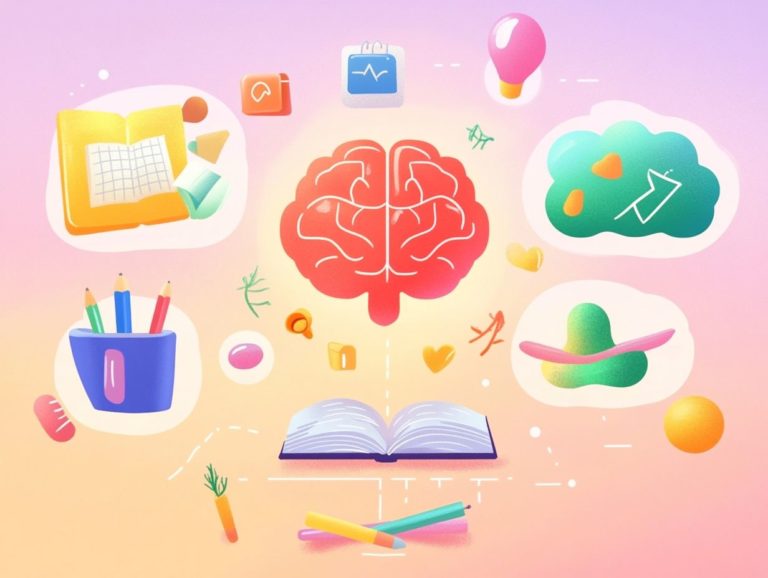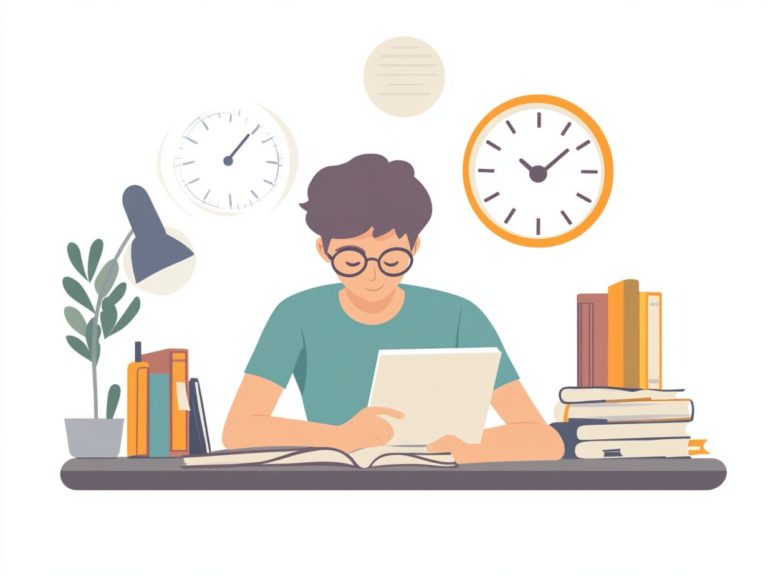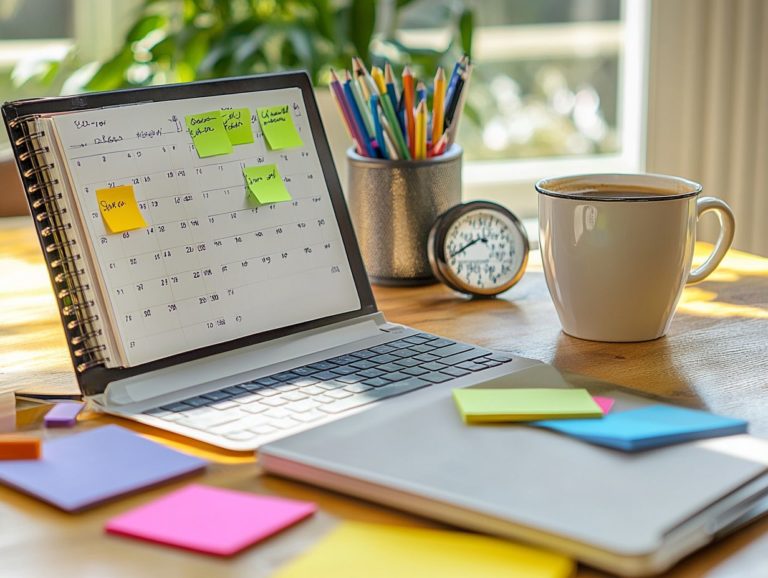tips for reducing test day stress
Test day can feel like a rollercoaster of nerves, but with the right strategies in your toolkit, you have the power to turn that anxiety into unwavering confidence.
Get ready to transform your test day stress into confidence! This article presents practical tips that will guide you in preparing effectively, staying calm, and shining bright when it truly counts.
From ensuring you get a restful night s sleep to honing your time management skills during the exam, these insights will arm you with the essential tools to navigate any test with ease.
Contents
- Key Takeaways:
- 1. Prepare in Advance
- 2. Sleep Your Way to Success!
- 3. Eat a Healthy Breakfast
- 4. Arrive Early
- 5. Take Deep Breaths and Relax
- 6. Visualize Success
- 7. Stay Positive
- 8. Don’t Cram Last Minute
- 9. Use Time Management Techniques
- 10. Read and Understand Instructions Carefully
- 11. Start with Easier Questions
- 12. Take Breaks as Needed
- 13. Don’t Compare Yourself to Others
- 14. Master Focus and Eliminate Distractions for Exams
- 15. Remember to Breathe and Stay Calm
- Frequently Asked Questions
- What are some general tips for reducing test day stress?
- How can I prepare for a test in advance to reduce stress on test day?
- Feeling overwhelmed on test day? Here s what to do!
- How can I stay calm and focused during the test?
- Can nutrition and hydration affect test day stress?
- What should I do after the test to alleviate stress?
Key Takeaways:
Prepare for test day in advance to reduce stress and ensure success.
Get a good night’s sleep and eat a healthy breakfast to have a clear mind and energy for the test.
Use time management techniques, take breaks, and stay focused to avoid feeling overwhelmed during the test.
1. Prepare in Advance
Preparing in advance is essential for managing test anxiety and ensuring optimal performance during exams.
Not only does it reduce stress symptoms, but it also enhances your overall exam preparation.
By organizing your study materials, crafting a structured study plan, and making the most of campus resources like the Writing Center and Counseling and Psychiatric Services, you can significantly boost your confidence and reduce unnecessary panic as you approach exam day.
These foundational strategies, along with various preparation techniques, can work wonders for you.
- Effective study methods such as active recall and spaced repetition promote deeper learning and retention of information.
- Time management strategies like the Pomodoro Technique help break your study sessions into manageable intervals, allowing for regular breaks and minimizing burnout.
- Taking advantage of campus resources, including tutoring services, can provide you with personalized guidance in challenging subjects.
- Try relaxation techniques like mindfulness meditation to lower your anxiety and create a calmer mindset.
By integrating these resources and techniques into your routine, you can enhance your readiness and approach your exams with greater assurance.
2. Sleep Your Way to Success!
A good night’s sleep is crucial for maintaining your mental health and alleviating the emotional symptoms of test anxiety.
When you’re sleep-deprived, stress can amplify, and your cognitive function during exams may suffer.
Adequate sleep sharpens your focus and enhances memory retention, making it essential for anyone striving for peak performance, whether academically or professionally.
When your brain is well-rested, it processes information more effectively, enabling you to recall details and concentrate on tasks with greater ease.
To cultivate restorative sleep, establishing a bedtime routine is vital.
Incorporating relaxation techniques can significantly reduce anxiety levels.
Simple practices such as deep breathing or guided visualization before bed create a serene atmosphere, allowing your mind to unwind and prepare for rejuvenation.
3. Eat a Healthy Breakfast
Eating a healthy breakfast is a crucial aspect of self-care that can significantly influence both the physical and emotional symptoms of test anxiety.
It provides the essential nutrients you need to fuel your body and mind during those stressful exam periods.
Incorporating foods rich in vitamin C think oranges and strawberries can elevate your mood and enhance cognitive function.
Meanwhile, protein-packed choices like eggs and Greek yogurt help keep your energy levels steady.
These nutrient-dense options aren t just about staving off fatigue; they also help mitigate the impact of stress hormones that can heighten anxiety.
A balanced breakfast sets a positive tone for your day, giving you the power to tackle challenges with a clearer mind and more stable emotions.
Opting for whole grains, fruits, and healthy fats allows you to create a comprehensive meal that nurtures your mental resilience, ensuring you approach examination scenarios with calm and focus.
4. Arrive Early
Arriving early for your exam can significantly lower your anxiety. It helps you adjust to the environment and use calming techniques before the test.
This extra time allows you to practice deep breathing. These exercises can lower your heart rate and help you feel calm.
Shifting your focus away from the pressure of the test sets the stage for a more composed experience. Reducing last-minute stress enhances your mental clarity, making it easier to recall information.
Establishing this proactive routine fosters a positive mindset, contributing to improved performance and a more confident approach during the exam.
5. Take Deep Breaths and Relax
Deep breathing exercises and relaxation techniques can significantly ease your test anxiety. They soothe your nervous system and enhance your sense of control during exams.
Engaging in these practices helps reduce feelings of tension and overwhelm. Start in a quiet, comfortable space to mentally prepare.
Inhale slowly through your nose, hold it for a few seconds, and exhale gently through your mouth. This routine helps regulate your breath and instills a calming sensation.
Acknowledge your efforts after integrating these techniques. This positive reinforcement boosts your self-confidence and reinforces the effectiveness of these calming strategies.
6. Visualize Success
Imagining positive outcomes can help you overcome test anxiety. This practice reduces your performance anxiety and boosts your confidence.
While visualizing, create a vivid mental image of yourself performing well. This fosters a sense of accomplishment and cultivates a positive outlook towards upcoming challenges.
By incorporating visualization into your meditation, center your thoughts on achievable goals. This transforms fear into motivation.
When you see yourself navigating the test with ease, you gain a sense of control over your preparation. This control is a powerful tool for managing stress.
7. Stay Positive
Stay positive! It s your secret weapon against test anxiety. Negative self-talk can undermine your performance and heighten feelings of stress.
Focusing on your strengths unlocks a path to greater resilience. Encouragement from peers creates a supportive environment that propels you forward.
Combat negative self-talk by journaling affirmations that celebrate your capabilities or surrounding yourself with uplifting friends.
Constructive self-dialogue can transform your approach, shifting your thoughts from fear of failure to a mindset that embraces growth.
8. Don’t Cram Last Minute
Cramming can significantly increase your test anxiety and undermine your preparation. It often leads to a shaky grasp of the material.
Implement effective study techniques and master your time management. Instead of waiting until the night before, break down your syllabus into manageable sections.
This method builds long-term memory retention and confidence, allowing for deeper engagement with the content.
Prioritize consistent study habits over a chaotic last-minute scramble. You ll navigate the preparation process more productively.
9. Use Time Management Techniques
Effective time management techniques can reduce test anxiety. They provide a structured approach to preparing for exams.
Develop a study schedule to set aside time for each subject. This makes studying feel more manageable.
Setting realistic goals is crucial. Break larger tasks into smaller, achievable milestones to clearly see your progress.
These methods enhance your concentration and help establish a consistent routine. This effectively alleviates overwhelming feelings during exams.
10. Read and Understand Instructions Carefully
Reading and understanding instructions is crucial for exam prep. It can significantly reduce test anxiety.
Being fully aware of what is expected allows you to approach exams with assurance.
This heightened awareness boosts your confidence and helps you manage your time and effort more effectively.
Quickly find key instructions by scanning for bold or highlighted sections, as these often signal crucial information.
Underlining or jotting down essential points enhances your understanding. Summarizing main tasks in your own words reinforces comprehension and minimizes misunderstandings.
11. Start with Easier Questions
Start your exam with easier questions to boost confidence. It creates a positive flow into the harder material.
When you begin with manageable questions, you experience quick wins that reinforce your belief in your abilities.
This initial success elevates your confidence and lowers cortisol levels associated with performance anxiety.
As you tackle simpler queries without stress, you re likely to approach subsequent questions with a focused and resilient mindset. This strategy improves overall performance.
12. Take Breaks as Needed
Taking breaks during an exam is a powerful way to manage test anxiety. It helps you recharge and refocus.
Weaving short breaks into your exam strategy can significantly improve concentration and information retention.
During these intervals, practice relaxation techniques like deep breathing. This can greatly reduce your stress levels!
Incorporating simple stretching exercises rejuvenates your body and enhances blood circulation. These practices reduce testing pressure and improve overall performance.
Using these brief moments to reset helps you tackle remaining tasks with renewed vigor and confidence.
13. Don’t Compare Yourself to Others
Don’t compare yourself to others. It’s crucial for managing test anxiety.
Such comparisons amplify emotional symptoms, leading to feelings of inadequacy and pressure.
When you measure your achievements against peers, it’s easy to overlook your unique strengths and personal journey.
Instead of fixating on what others are doing, focus on your own preparation and growth. Embrace a supportive peer environment to uplift one another and foster community.
14. Master Focus and Eliminate Distractions for Exams
Staying focused and minimizing distractions during an exam are vital steps in managing test anxiety and enhancing your performance. Distractions can easily lead to increased performance anxiety and hinder your concentration.
To create an environment that promotes concentration, incorporate mindfulness meditation techniques into your daily routine. These practices help you become more aware of your thoughts and surroundings, allowing you to gently guide your attention back to the task at hand.
Identify those pesky distractions right away, like noise or intrusive thoughts, and develop strategies to address them. Setting up a designated study space, using noise-canceling headphones, and practicing breathing exercises can significantly reduce anxiety and sharpen your focus.
By implementing these strategies, you can navigate exam situations with greater ease, leading to a more confident and composed performance.
15. Remember to Breathe and Stay Calm
Remembering to breathe and stay calm is essential for managing test anxiety. Engage in deep breathing exercises to center your mind and alleviate performance anxiety when the pressure mounts during exams.
These techniques provide immediate relief while fostering a deeper sense of tranquility and focus. Deep breathing slows your heart rate, lowers blood pressure, and optimizes oxygen flow, enhancing your cognitive function.
For instance, the 4-7-8 breathing technique invites you to inhale for four counts, hold for seven, and exhale for eight. Practice this rhythmic pattern in advance of your exams.
Adopting abdominal breathing also reinforces the relaxation response, enabling you to approach your tests with increased confidence and composure.
Frequently Asked Questions
What are some general tips for reducing test day stress?
Some general tips for reducing test day stress include getting a good night’s sleep, eating a healthy breakfast, arriving early to the test location, and using top mental techniques to reduce test anxiety like taking deep breaths to calm nerves.
How can I prepare for a test in advance to reduce stress on test day?
To prepare in advance and reduce test day stress, create a study schedule and stick to it. Practice with tests or flashcards, and ask for help from a teacher or tutor if needed.
Feeling overwhelmed on test day? Here s what to do!
If you start to feel overwhelmed on test day, take a moment to close your eyes and take deep breaths. Remind yourself that you have prepared and can do this. Try positive self-talk or relaxation techniques like visualization or progressive muscle relaxation.
How can I stay calm and focused during the test?
To stay calm and focused during the test, take deep breaths, read each question carefully, and answer the easier questions first. Don t spend too much time on one question, and remember to take breaks when needed.
Can nutrition and hydration affect test day stress?
Yes, proper nutrition and hydration can help reduce test day stress. Be sure to eat a healthy breakfast and stay hydrated throughout the day to keep your mind and body functioning at their best.
What should I do after the test to alleviate stress?
After the test, take some time to relax and do something you enjoy. Avoid discussing the test with others and trust that you did your best. Make sure to get enough rest and take care of yourself physically and mentally.





